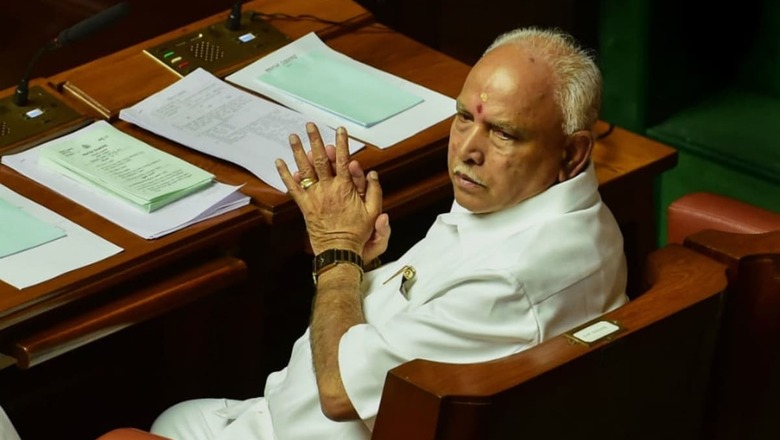
views
Karnataka has seen a fresh uprising of some communities seeking better reservation, better caste-based benefits. The STs want an increase in their quota, the Panchamasali Lingayats want to be moved to a category that gets a larger quota, the Kurubas want to be listed as STs, the Vokkaligas want to collectively lobby for better everything. Significantly, these are all dominant castes — castes with populations of 12 to 15 per cent of the state’s population, translating into high numbers, high vote-swaying influence.
Caught in this battle of the castes is chief minister BS Yediyurappa, who wants to please all but also knows that’s not entirely possible. On Wednesday, the Karnataka government then did the next best thing — it formed a committee headed by a retired judge, Justice Subhash B Adi, to consider the various demands of different communities. There is no time limit set for its functioning, but does this address the core issues?
An earlier committee that was formed to look into the demand for an increase in the quota of SCs and STs submitted its report last July. Justice Nagamohan Das, who headed that committee, says dominant communities enjoying benefits of various quotas may end up stepping on the aspirations of communities which have for decades not got any benefits despite being eligible for these.
Besides, of what use is reservation when institutions are getting privatised and hence have no place for reservation?
Excerpts from an interview:
You were tasked with studying the need for increasing reservation for SC/STs. There is a new demand from many communities for more benefits — is this justified?
My first point in so far as reservation is concerned, if anybody has serious concerns about reservation, we all must debate and discuss and work out a programme in favour of the communities that have not reaped the benefits of reservation in the past 70 years.
Even after 70 years of Independence, some of the weak communities have not got reservation… for example, adivasis, nomadic and seminomadic tribes, Devadasis and their children, safai karmacharis (sanitation workers), slum dwellers… they have not reaped any benefit.
So the first attempt should be to reach the policy of reservation to those who are disadvantaged sections— they should be the first priority.
My second point is, in the past 70 years, no doubt… by implementation these communities have benefited to some extent.. but only a small section has benefited. Now we are at a stage that we are losing the benefits that we have already derived.
For e.g., in the public sector and central and state governments, there are nearly 60 lakh sanctioned posts that are vacant. In Karnataka, there are nearly 2.64 lakh sanctioned posts vacant. If these posts are filled, lakhs of families will benefit and they will have two square meals a day. Is it not our duty to raise our voice for this?
Besides, from 1992 till today, in the name of disinvestment, a large number of public sector undertakings are made private, where there is no reservation. In this way, we are losing all those jobs available for reservation.
Thirdly, when sanctioned posts are vacant, why do you appoint contract labours and outsource? No reservation norms are applicable for outsourced work.
Specifically, a dominant community like Panchamasali Lingayats… there is a feeling that there are many people educationally and economically backward within this community. Is this agitation that has gone on for two months justified?
Whether it is Lingayat Panchamasalis or Kurubas, a large number — nearly 80 per cent — are poor. They are agriculturists with small landholdings. The whole agriculture sector is in crisis, not only among Panchamasalis and Kurubas, but among all communities involved in farming. Agriculture is in crisis — economically and socially they hare deteriorated. They are unable to educate their children or get them jobs. So, to find a way out, if someone says reservation will benefit them, they will rush to demand that. There is a genuine pain in the farming community where they are facing serious challenges.
Under the circumstances, even if we provide reservation as demanded, it may benefit just one or two per cent. A large section of the community will remain unbenefited.
But the reason for their pain is the agriculture crisis, which we have to address. Reservation is not the remedy.
Simply because the availability of vacancies of jobs for reservation is coming down, shrinking day by day. If 100 people are in the queue for reservation, maybe two or three will get a quota job. What will you do with the other 97?
In these 70 years, no doubt we have provided reservation, but it has benefited only a small section of people. The larger section remains without benefits. But we have to find ways and means where all sections in all categories benefit.
Two years ago, Lingayats wanted to be treated as a minority. Now they want to be on the central OBC list. Is there discord in their demands?
In these 70 years of reservation, certain problems have emerged and we have not framed laws to deal with them efficiently. Even judgements of courts are not consistent in this regard. In these 70 years, there is growth in vertical reservation and in horizontal reservation. There is no internal reservation and we have created new categories — women, ex-servicemen, those from rural areas, etc. In 2019, the government of India has even brought reservation for economically weaker sections in the general category.
In addition, there is a creamy layer policy, reservation in promotions; a section have already raised their voice in demanding reservation in the private sector.
These issues remain unresolved. There is no law governing these areas efficiently; even court judgements are not consistent in these areas. Therefore, I demand rewriting the entire reservation policy addressing these issues. We must not give up reservation, but we must address these issues. There are too many inconsistencies in laws — central and states have separate lists — but the demands are genuine demands.
Both Kurubas and Panchamasalis have started agitations, but other castes or subsects of other castes in these categories may be affected if their demands are met.
Already in Karnataka, the castes in certain categories have raised their voice: “If so-and-so is included in our category, we will be affected.” It is quite natural. By including Kurubas in the ST category, other small sections among Scheduled Tribes who have not reaped the fruits of reservation in 70 years (like adivasis and nomadics) will be much more affected. So also, these Panchamasalis… if they are brought into category 2A as they demand, there are so many smaller subsects there who will be affected. Already those communities have raised their voice opposing the inclusion. This will grow tremendously in the days to come, if we don’t find a scientific rewriting of the entire policy of reservation.
Read all the Latest News, Breaking News and Coronavirus News here



















Comments
0 comment